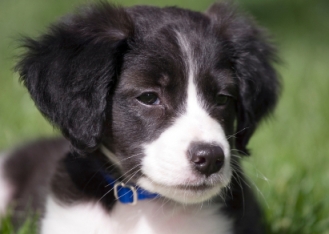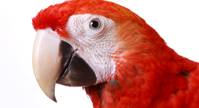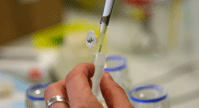Sensory Neuropathy - Border Collie
Description:

Sensory neuropathy (SN) is a progressive neurological disorder in Border Collies. It is caused primarily by the degeneration of sensory nerve cells, although some motor nerve cells can also be affected. Symptoms of the disorder generally appear between 2 and 7 months of age.
Clinical signs include difficulty walking due to abnormal extended limbs. Hind limbs are generally more affected than the front front limbs. Additional symptoms include the knuckling of paws, muscle atrophy, urinary incontinence, and regurgitation. These signs are typically seen in later stages of the disease. Affected animals often develop a tingling or numbing sensation, which drives them to lick or chew on their limbs and feet excessively. This results in large wounds caused by self-mutilating behavior. The prognosis is poor. Due to the severely poor quality of life, dogs that are diagnosed with SN are often euthanized within 18 months.
It has been discovered in Border Collies that a mutation (specifically, an inversion) in the FAM134B gene is the genetic cause for a genetically recessive form of the disease. This means that a dog must have 2 copies of the mutated FAM134B gene (one coming from each parent) in order for the dog to experience symptoms. Dogs with one copy of the mutated gene are considered carriers and will not be affected. It is importantly to realize, however, that they can pass the mutated gene onto 50% of its offspring.
Acceptable Sample Types:
Animal Genetics accepts buccal swabs, blood samples, and dewclaw samples for testing. Complimentary sample collection kits are available and can be ordered at Canine Test Now.
This Test Is Relevant for the Following Breeds:
- Border Collie
Results:
Animal Genetics offers DNA testing for Sensory Neuropathy (SN) in Border Collies. The genetic test verifies the presence of the recessive mutation and presents results as one of the following:
| SN/SN | Affected | The dog carries two copies of the mutant gene and is homozygous for the FAM134B mutation associated with SN. The dog will develop SN symptoms and will always pass a copy of the mutation to its offspring. |
| N/SN | Carrier | A copy of the FAM134B gene mutation is present. Dog is a carrier and will pass on a copy of the defective gene to its offspring 50% of the time. Be aware that if breeding with another SN carrier, the litter will develop SN. |
| N/N | Clear | Sample tested negative for the FAM134B gene mutation that causes SN, and cannot pass on the defective gene to its offspring. |
Reference:
An Inversion Disrupting FAM134B Is Associated with Sensory Neuropathy in the Border Collie Dog Breed
Oliver P. Forman, Rebekkah J. Hitti, Louise Pettitt, Christopher A. Jenkins, Dennis P. O'Brien, G. Diane Shelton, Luisa De Risio, Rodrigo Gutierrez Quintana, Elsa Beltran and View ORCID ProfileCathryn Mellersh G3: GENES, GENOMES, GENETICS September 1, 2016 vol. 6 no. 9 2687-2692; https://doi.org/10.1534/g3.116.027896
Submit a Sample for Testing:
To submit a sample for testing please go to Canine Test Now.
To
order a sample collection kit please go to order sample collection kits.
Cost per sample is $45.00. Please see our Canine Fee Schedule for all test rates.










